Theoretical thinking plays a very important role in perceiving and transforming the world. Thanks to scientific theoretical thinking, people can discover the laws of motion and development of objective reality, directing that motion to serve human interests. F. Engels pointed out that: "A nation that wants to stand firmly at the pinnacle of science cannot do without theoretical thinking." (1)
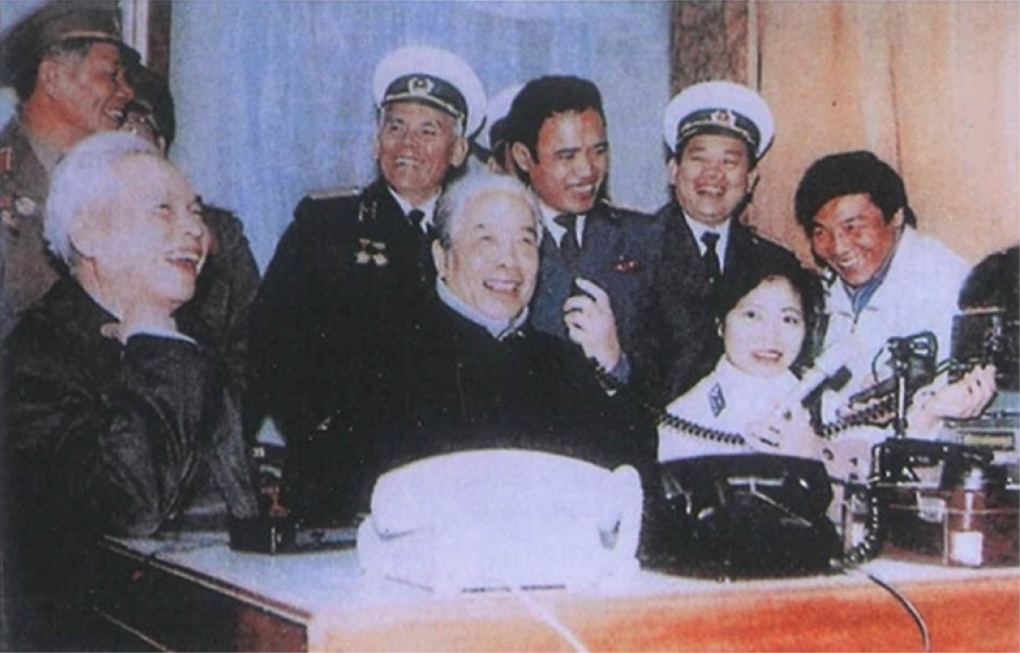 |
General Secretary Do Muoi and comrade Dao Duy Tung, Politburo member, Standing member of the Politburo - Secretariat, talked by phone with Truong Sa soldiers. Photo provided by family |
Accordingly, a person who is called to have theoretical thinking is not only “innate talent”, but also a long process of experience in practical work, passion for research, summarizing practices to draw out the laws of social movement, or in other words, finding the nature, methods, and steps to achieve the goals of our country’s revolution. One of those people with such qualities is Comrade Dao Duy Tung. He has made important contributions to the formation of our Party’s innovative thinking.
Assessing his great contributions, on the occasion of the first anniversary of comrade Dao Duy Tung's death, General Secretary Do Muoi wrote: "Comrade Dao Duy Tung's longest working period was at the Central agency, more than 30 years of ideological and theoretical work for the Party, from May 1955 to 1998, when he left us.
In the propaganda sector, he successively held the positions of Deputy Director, Director of the Training Department, Deputy Director and Editor-in-Chief of the Communist Magazine, Director of the Marxist-Leninist Institute and Head of the Central Propaganda Department. He was continuously elected to the Party Central Committee for 4 terms, from the 4th Congress, 5th Congress, 6th Congress and 7th Congress, of which, in 2 terms, he was elected as a member of the Politburo and Secretary of the Party Central Committee.
During most of his time working at the Central Committee, when assigned to be in charge of propaganda, he devoted much effort to theoretical research, summarizing practical propaganda work, educating political theory and the Party's guidelines and viewpoints, and fighting sharply, seriously, and effectively against viewpoints contrary to the Party's guidelines and viewpoints.
Comrade Dao Duy Tung is a character with innovative thinking, always searching and creating new factors to surpass himself. He was also one of the people who participated in innovation since the 1980s, along with the "trial contracts" in Vinh Phuc, Hai Phong, "contract 100" then "contract 10", to the Innovation Platform later" (Excerpt from the article published in Nhan Dan newspaper).
Thus, the contributions of comrade Dao Duy Tung in the field of ideological and theoretical work are very broad and great. In the scope of this article, I would like to limit them to the fields of information - journalism, culture - arts.
1. In the field of information and journalism
To innovate theoretical thinking, he paid special attention to the issue of information. He pointed out that innovation in information work is an important condition for innovation in thinking. Because only with correct information can one have correct thinking, without receiving information there is nothing to think about. If one receives incorrect information, one cannot think correctly. He emphasized that openness and democracy in information are conditions for developing scientific thinking, fighting against authoritarianism in thinking, and promptly detecting stagnation or corruption in thinking.
Therefore, after the 6th Party Congress, Mr. Dao Duy Tung directed the drastic improvement of the Party's information activities. According to him, in order to meet the requirements of the revolution, information work needs to be improved in the following directions: diversifying information and increasing the amount of useful information; expanding the transparency in information activities; information must be authentic, contributing to building new thinking, overcoming backward thinking; bringing the people's voice to the Party and State leadership agencies at all levels; enhancing criticism and self-criticism in the mass media, highlighting both positive and negative factors; bringing information to the right audience, all the way to the workers.
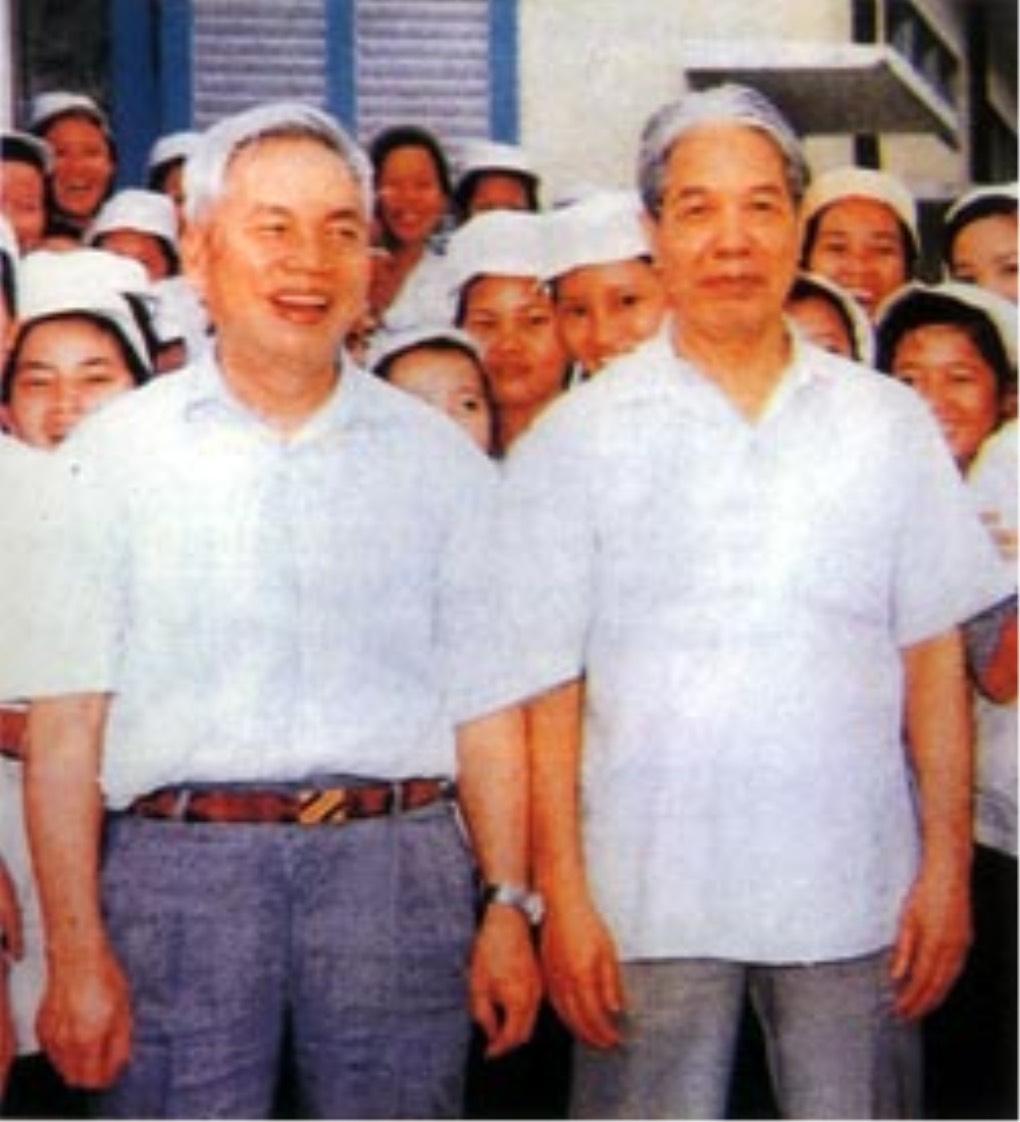 |
General Secretary Do Muoi and comrade Dao Duy Tung visited and worked in An Giang province in 1993. Photo archive |
As the Party's ideological, press and propaganda leader, comrade Dao Duy Tung repeatedly affirmed: The Party and the State always consider the press a very important and indispensable arm of the revolution and in any period, the press clearly demonstrates its vanguard role on the Party's ideological front. The press is the voice of the Party, the State and social organizations, and at the same time is a forum for the people. One of the important contents of the press is to encourage the mass movement to promote production and practice thrift; promptly discover and commend good initiatives and good deeds in the process of transforming the economic structure and management mechanism, implementing industrialization and modernization of the country, building a culture imbued with national identity and nurturing Vietnamese people in terms of both intelligence and physical strength, in terms of qualities and intelligence. Along with praising the good and the good of the new regime, the press attaches importance to criticizing the evil, the bad, the corruption, the bureaucracy; criticizing those who spread skeptical arguments, distort history, distort the Party and State's guidelines and policies... The press not only reflects social reality, but also has the responsibility to properly orient public opinion before each domestic and international event.
As a direct leader of the press agency, comrade Dao Duy Tung spent 17 years (1965 - 1982) directly working as Editor-in-Chief of the Study Magazine, now the Communist Magazine - the theoretical and political agency of the Party Central Committee. With a long period of direct leadership of the Study Magazine, comrade Dao Duy Tung contributed decisively to the Party's theoretical magazine's remarkable and comprehensive development.
2. In the field of culture and arts
When the 10th Politburo issued a specialized resolution on literature and art (2008), I read his articles on this issue. It can be said that many of his views and assessments were inherited and developed to a new level by Resolution 23 on “Continuing to build and develop literature and art in the new period” . Rereading the speech of comrade Dao Duy Tung at the 6th Conference of the 6th Party Central Committee, I truly admire him because many of his assessments are still relevant today. For example, from the very diverse and complicated reality of the ideological situation in general and literature and art in particular at that time, he still affirmed: Literature and art in our country “had a new step of development, had a new development” with several prominent manifestations: in the creation of various types of literature and art, “a number of good works have begun to appear” ; “in theory and criticism, there were quite a few discussions and debates” . But along with those important and commendable manifestations, he also frankly pointed out “shortcomings and deviations that cannot be ignored” . For example, regarding the viewpoint of “having the idea of denying the literary achievements of the previous period, thinking that the literature of the previous period was illustrative literature, court literature, official literature, and inauthentic literature...” . It is necessary for literature and art to participate in fighting negativity, but “some articles, films, plays... depicting the negative aspects excessively, not following the spirit of construction, have evoked a pessimistic and deadlocked mood”; “the unhealthy entertainment trend, chasing after profit, chasing after trivial tastes... has caused very serious consequences” . Regarding organization, he pointed out that “the situation of disunity in the literary and artistic circles is an issue that cannot be ignored”.
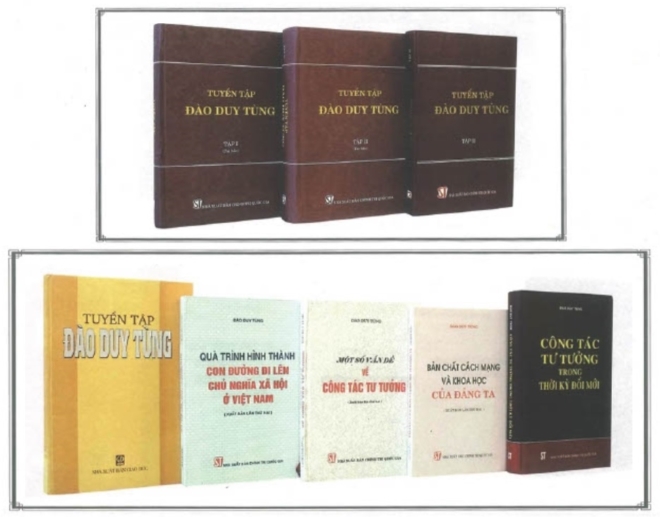 |
| Theoretical works of comrade Dao Duy Tung. |
In many of the arguments mentioned to overcome the above shortcomings and deviations in both fields, with dialectical thinking and a firm grasp of the nature of the ideological situation in the press and culture and arts, he emphasized several basic solutions that we continue to implement today. These are: ensuring the right to receive information for cadres, party members and people; expanding democracy in ideological work, implementing transparency in information, ensuring conditions for cadres, party members and people to freely express their opinions through newspapers, radio; through seminars, scientific discussions, etc. I deeply understand what he emphasized: "We must expand democracy, but democracy must go hand in hand with the law, respect the law. The process of expanding democracy must both fight against acts that violate the people's democratic rights and fight against extremist democratic tendencies, bourgeois democracy, and not let bad guys and enemies take advantage to oppose our regime" .
3. The theorist skillfully combines theory and practice.
I have not had the opportunity to read and study in depth all of his writings and speeches throughout his career, but there is a practical story that makes me admire his scientific thinking and methodology. That was in 1979-1981, I attended a two-year intensive advanced theory training course at Nguyen Ai Quoc Academy (now Ho Chi Minh National Academy of Politics).
This was the time when the Party Central Committee was preparing to issue a Resolution on Product Contracts to Workers (abbreviated as “Contract 10”), with many conflicting opinions. I had the opportunity to read the summary article of comrade Dao Duy Tung at the National Conference of Heads of Agricultural Committees held in Hai Phong from December 23 to 26, 1984. The article was only 7 pages long, but for me and journalists, it had a practical effect on press information work. I would like to summarize some basic points in this summary article. Regarding the new and positive points in agricultural development over the past three years (1980-1983), he pointed out 3 points: labor was well combined with land, which created a multi-faceted development step, notably rice intensification; a part of the old management mechanism in agricultural cooperatives that had for many years restrained the positivity of members was eliminated; Overcoming the rather serious and prolonged situation, restoring the positivity of labor and the confidence of workers... Along with the 3 points mentioned above, he noted: many labor potentials have not been exploited, in some aspects, the socialist battlefield has been encroached upon, even in some places has declined...
From the practical research on "contracting" in agriculture, he answered the somewhat "tricky" questions and concerns: does contracting shrink the collective economy; does it disintegrate livestock farming; does it destroy the technical and material basis and does the private ownership mentality develop?... I know that in order to have this summary, he went to the cooperatives in Hai Phong, Vinh Phuc, Hai Hung... many times, directly listening and talking to the cadres and members to find out what are the basic advantages, what problems are still stuck in order to give convincing answers because of the clear scientific and practical nature. What is special is that, reading his articles, I see that he rarely quotes Marx, Engels, Lenin..., but that does not mean that the arguments he raises are far from the basic principles of Marxism-Leninism, because in each article, he has shown a smooth combination of theory and practice.
It has been exactly 35 years since the thinker, theorist, and journalist Dao Duy Tung left us. The further back in time, the more his important and valuable contributions to the Party's ideological and theoretical front shine./.
Associate Professor, Dr. Nguyen Hong Vinh
Former Member of the Central Party Committee
Former Editor-in-Chief of Nhan Dan Newspaper
(1) C.Marx and F.Engels: Complete Works, vol.20, National Political Publishing House, Hanoi, 1995, pp.720, 489.
Source


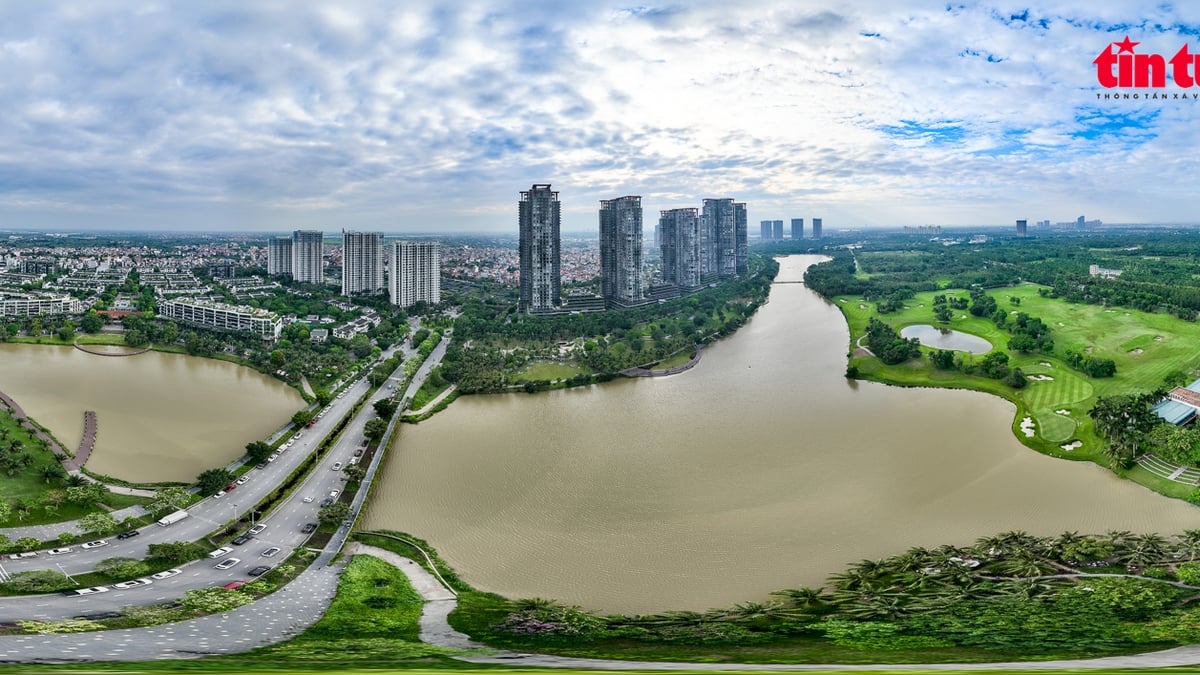












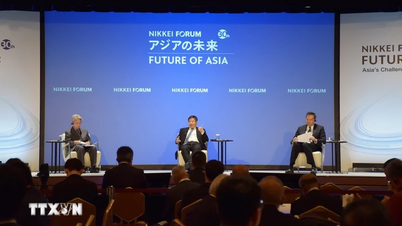

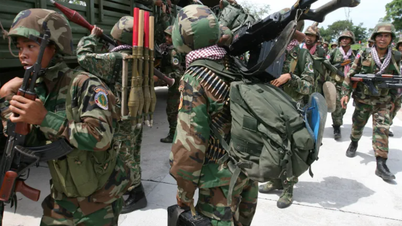



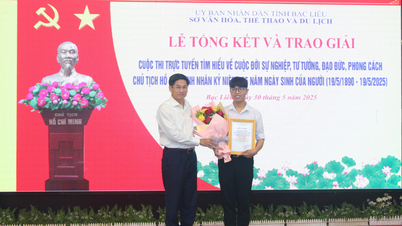
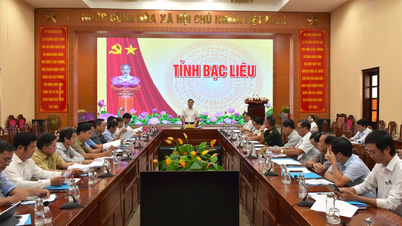
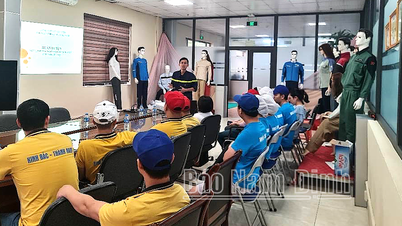
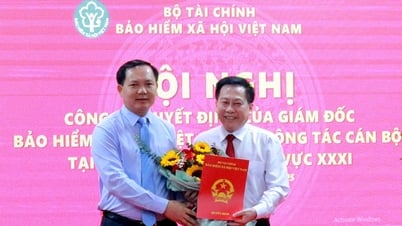
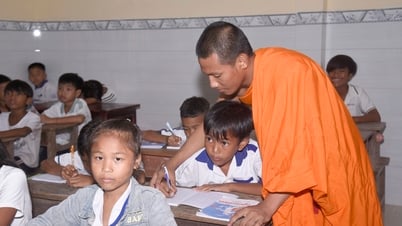




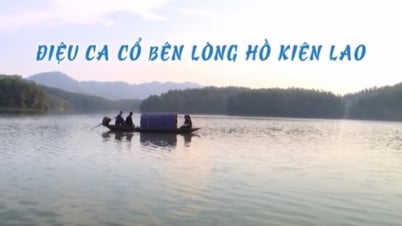



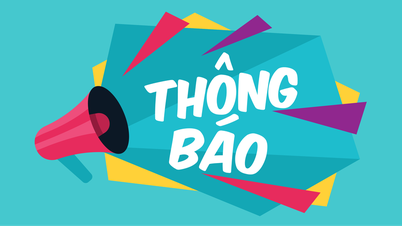
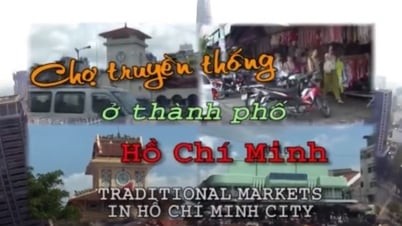





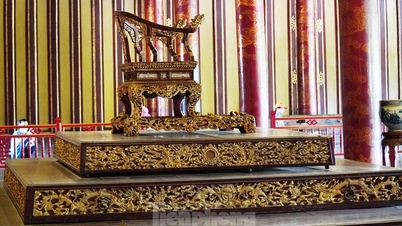

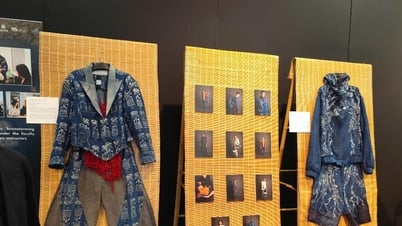













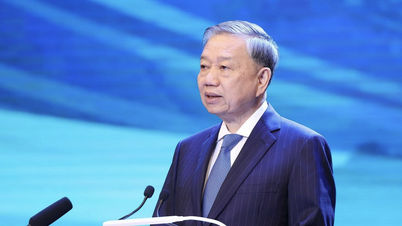
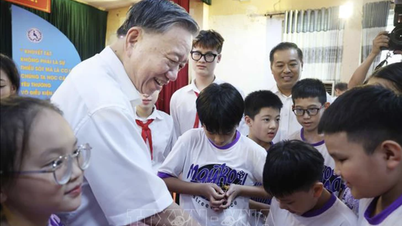


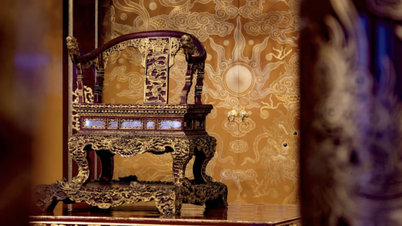
















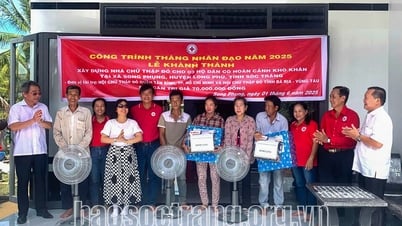



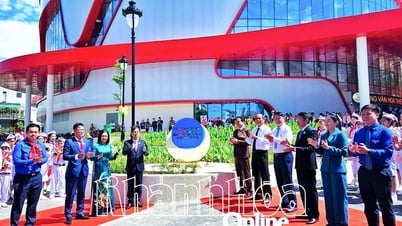

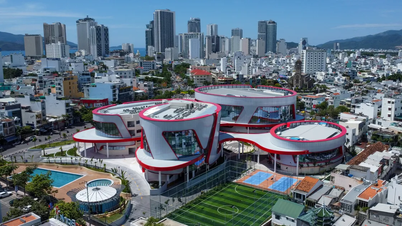

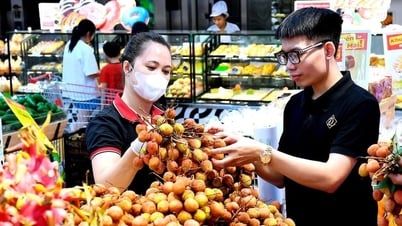






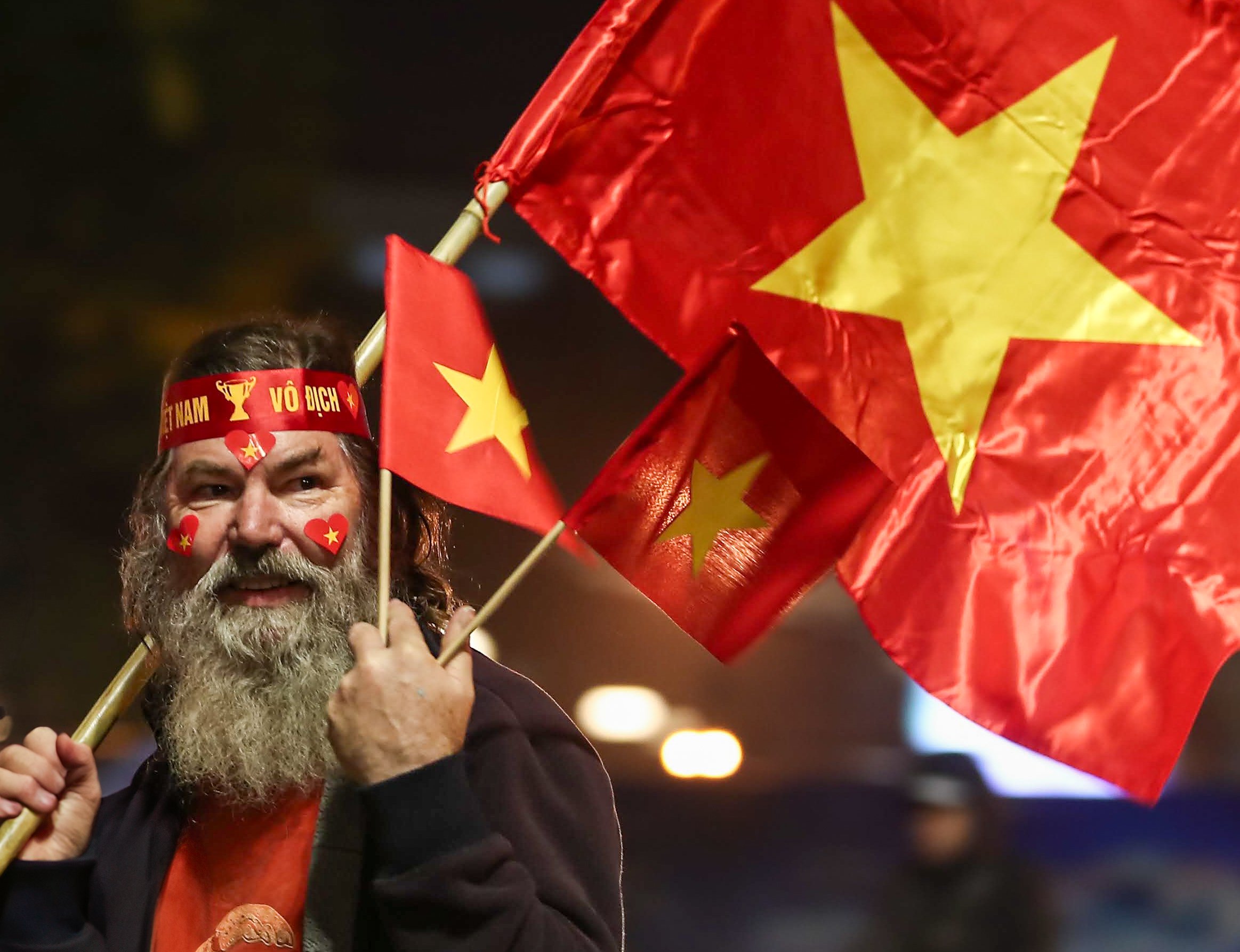



Comment (0)